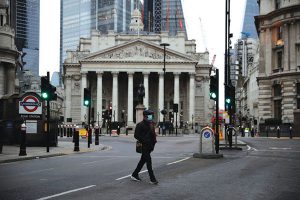Stand on the steps of The Royal Exchange in the heart of the City of London and you can picture the churn of people 200 years ago or more in what was becoming the world’s preeminent financial hub. Stock jobbers, traders and financiers would stream between its great limestone columns with the Bank of England to one side and all surrounded by offices of bankers or trading houses and alleyways to the ever-busy coffee shops.
The exchange was where transactions happened, but the coffee shops played an equally important role in the lifeblood of markets as information centers. People hung out there for refreshment and gossip but also all the details of supply and demand.
Today, London’s future as a global financial hub is under threat. In the popular discourse, that’s largely due to Britain’s exit from the European Union and the ongoing fights over trade and regulations. But Brexit is barely half the story, and New York faces similar threats. While, JPMorgan Chase & Co is expanding its Paris office with new trading floors, Goldman Sachs Group Inc is doing the same in Miami and has been hunting for space in Dallas.
What links these moves is the ways technology and regulations have dramatically changed the flow of information in just the past couple of decades. The Covid pandemic showed just how little physical location now matters for many jobs and businesses in finance and gave executives confidence that more operations could be managed remotely.
Old hands barely recognise today’s world.
Telephone calls, instant messages and emails are all recorded for posterity. Personal communications are ever more tightly controlled: Credit Suisse Group AG is seeking access to employees’ personal devices, while JPMorgan was just fined $200 million for not recording everyone’s WhatsApp messages. Compliance is paramount as a deterrent and as a record of how and why everything was done.
That electronification has allowed banks to manage their own balance sheets more efficiently. Most big investment banks have been building central risk functions with algorithms and data systems that generate quick tallies of their inventories of stocks or bonds, what they can source from their clients at any given moment and what clients are interested in buying: in other words, a smarter version of the old market color of a noisy trading floor.
Speed and risk mitigation are everything for banks in the post 2008-world of high transparency and low returns. Investment banks are becoming more machine-like and much less dependent on human capital. The most complex transactions, like buying and selling whole businesses, probably needs face-to-face negotiation, but Covid pandemic showed how much could be done by video.
Human networks and relationships are important for dissemination of know-how and skills. But just because people of Generation X and older have always done this face to face says nothing about whether Gen Z will care to or need to.
Location just doesn’t matter for transactions or information flows like it once did. Financial hubs are in the minds and smart phones and terminals of the participants. This is the real challenge for London and New York.
—Bloomberg
 The Gulf Time Newspaper One of the finest business newspapers in the UAE brought to you by our professional writers and editors.
The Gulf Time Newspaper One of the finest business newspapers in the UAE brought to you by our professional writers and editors.
